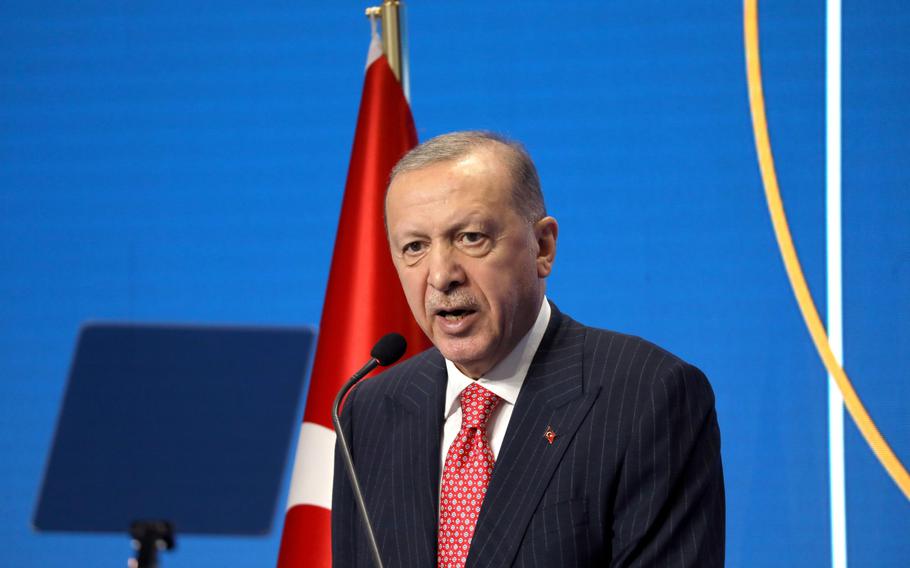
Turkish President Recep Tayyip Erdogan at the Group of 20 summit in Rome in 2021. (Alessia Pierdomenico/Bloomberg)
ISTANBUL - A Turkish court decided Thursday to move the trial of 26 suspects linked to the 2018 killing of journalist Jamal Khashoggi to Saudi Arabia, in what was widely seen as a concession by Turkish President Recep Tayyip Erdogan to the Saudi government as the two countries try to mend their strained relations.
Thursday’s decision by a panel of judges in Istanbul criminal court was a stunning reversal by Turkey, which in the years after the killing of Khashoggi in the Saudi Consulate in Istanbul went to extraordinary lengths to publicize the Saudi government’s role in the plot. More recently, though, Erdogan’s government has tried to improve ties with the kingdom as Turkey weathers one of its worst economic crises in decades.
The court ruling was roundly criticized Thursday by human rights groups as well as Hatice Cengiz, Khashoggi’s fiancee, who first alerted the world to the journalist’s disappearance after he entered the Saudi Consulate on an October afternoon. In the years since, she has traveled around the globe, speaking to parliaments, politicians and the news media in her quest to hold the perpetrators accountable.
“We are not going to give up just because of a legal judgment,” she told reporters outside the massive Istanbul court complex Thursday. “We cannot continue as if nothing happened.”
Much is known about what happened to Khashoggi, thanks to Turkey. Before his death, Khashoggi was contributing columns to The Washington Post, some of which were sharply critical of Crown Prince Mohammed bin Salman, Saudi Arabia’s de facto ruler.
Turkey released recordings, surveillance footage and other material revealing that a team of Saudi operatives had traveled to Istanbul and waited for Khashoggi, then killed him and dismembered his body. His remains have not been found. Erdogan, who called Khashoggi a friend, appeared outraged, saying that the killing was ordered at the “highest levels” of the Saudi government.
The kingdom, which faced worldwide condemnation over the killing, held its own trial behind closed doors but never named the suspects it was prosecuting. It announced in September 2020 that eight people had been convicted, but it has yet to provide any evidence that anyone has been imprisoned or that any high officials have faced punishment.
Turkey began changing its stance over the last two years amid signs that its activism in the Khashoggi case was taking a toll on the country’s economy and hurting Turkish exporters, who faced an unofficial boycott from businesses in Saudi Arabia and other Arab states allied with the kingdom. Turkey’s foreign minister visited Saudi Arabia last year, his first trip there since Khashoggi was killed.
Last month, in a surprise move, the prosecutor in the Turkish trial requested that the proceedings be halted and that the case be transferred to the authorities in Saudi Arabia, pursuant to a Saudi transfer request. The court referred the matter to Turkey’s Ministry of Justice.
On Friday, Turkish Justice Minister Bekir Bozdag said he would agree to the transfer request because none of the suspects in the case were in Turkish custody.
“The transfer of this file to a country where there is no justice is an example of irresponsibility against the Turkish people,” Gokmen Baspinar, a lawyer representing Cengiz, said in court Thursday, referring to Saudi Arabia. His colleague, Ali Ceylan, asked the judge to “protect the honor and dignity of the Turkish nation” by refusing to send the trial to the Saudis.
“Let’s not entrust the lamb to the wolf,” he said, before a judge ordered a brief recess.
During the break, Cengiz said the decision to halt the Turkish trial was a “big, big mistake” and that she would appeal the decision. She held out hope for a federal lawsuit brought by Cengiz and Democracy for the Arab World Now two years ago alleging that Khashoggi was tortured, murdered and dismembered on orders of the Saudi crown prince.
“We will look for justice in the United States,” she said, shortly before the judge halted the Turkish trial.
The court did “nothing more than act as glorified public notary in rubber-stamping the government’s decision,” said Emma Sinclair-Webb, the Turkey director for Human Rights Watch. “This is all about willingness to sacrifice this case in the interests of realpolitik.”
Cengiz, who is Turkish, shuttled from interview to interview outside the courthouse, the Caglayan Justice Palace, grappling with the decisions made by her government and the court. “What they did before was huge,” she said, referring to the Erdogan government’s decision to speak out about the killing of her fiance when others “in the West were silent,” she said.
“I understand the politics,” she said. “But you have a responsibility. You were representing a very important and historic case. And now, you give up,” she said. “I can say, I’m sad.”